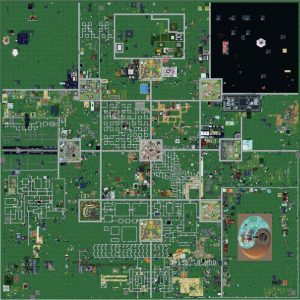The metaverse. Some are calling it the next phase of the internet. Some are saying it’s just the buzzword of the week. Since Facebook’s rebrand as Meta, the term has seen a huge spike in searches and the idea has the potential to be revolutionary. Metaverse developers promise to introduce a new phase of gaming and social interaction online, but will they achieve their goal? And what happens to the real world if they do?
What is the Metaverse
Despite Facebook’s rebrand, the metaverse isn’t just their platform. The metaverse instead refers to the larger digital, 3D worlds accessible primarily through virtual reality platforms. There are plenty of different metaverses out there right now. Facebook/Meta runs their digital universe through Horizon Worlds and there have been a few independent platforms cropping up like Decentraland and Sandbox.
If you have been paying attention to the financial world at all in the past year, you have heard of an NFT or non-fungible token. These NFTs are intangible goods that you can purchase using cryptocurrencies like Bitcoin and Ethereum. I realize these terms can become a bit nebulous, so I have linked explanations above. These can be helpful to understand what they are and how they function.

These NFTs and cryptocurrencies are critical to the function of the metaverse. In the case of Decentraland, users are able to purchase plots of land as they would in the real world using crypto. Their ownership of the land is an NFT itself as it is not tangible, but belongs solely to the user. These land plots can be used for just about anything and are the primary draw of metaverses currently.
What Happens in the Metaverse
As showcased in Facebook/Meta’s keynote back in October, it seems like just about anything can happen online. CEO Mark Zuckerberg showed off the potential capabilities of the program: meeting up with friends in a digital spaceship to play cards, surfing a virtual wave, or learning how to conduct surgery online. These are just a couple of the possibilities of Meta’s Horizon Worlds and other metaverses offer similar options. Decentraland recently held a rave (that may have been a little underwhelming) and even offers users a chance to watch the Australian Open in virtual reality. The opportunities are, in theory, limitless.

The biggest hope for the metaverse is for gaming. Microsoft, the developer of Xbox, recently acquired gaming behemoth Activision-Blizzard (creator of smash hits like Call of Duty and Overwatch). The idea of this purchase is the turn gaming companies like Xbox into a more Netflix-style company, operating as a subscription service with massive gaming libraries that users can subscribe to monthly. Companies will then be able to port massively successful games in the metaverse. This will allow users to experience their favorite games firsthand. This promise for gaming currently seems to be the main draw and offers the most promise for the metaverse.
How to Join
Right now, most metaverses are still in their infancy. Facebook/Meta has by far the best graphics out of the main platforms. Most platforms, particularly Decentraland, have clunky avatars that just are not up to industry standard. At the moment, this is the biggest inhibitor for the metaverse. Users ability to get realistic, smooth graphics on traditional consoles, which has driven the incentive to join a platform regarded as worse down.
The confusing paths to join and invest don’t make it any easier. Without logging on, users can purchase the aforementioned NFT land plots on platforms like Decentraland. These users can own large plots, but they still need a VR headset to even see their land. Similarly, Horizon Worlds offers spaces for 3D virtual meetings as well as a platform to play and exercise. The opportunities of the metaverse cannot be experienced without a pricy VR headset. This high cost to log on is another barrier developers will need to find a way to overcome.

What About the Real World
At this point, the parallels to Ernest Cline’s 2011 dystopian novel and subsequent movie, Ready Player One, are pretty apparent. For those who missed the book, Ready Player One takes place in a world not too far into the future. Users can log onto a digital world (like the metaverse) and forget all their worldly problems. In the book, human obsession and addiction to their virtual world left the physical world neglected and many are beginning to wonder the same thing about the metaverse.

Right now, the biggest concern is regarding corporate involvement in the space. Companies like Facebook/Meta doesn’t exactly have the best history when it comes to protecting users’ data, worrying some users that their information could be used against them for advertising. Couple that with everything turning into a subscription service nowadays, and it’s likely that these platforms soon won’t be free to play. With other major companies like Microsoft, Apple, and even Nike investing, it is likely that they will be looking to turn a profit soon. Whether that’s inundating users with ads or a subscription, these corporations will assuredly look to turn a profit soon.
The internet is preparing to enter a new age of interaction and interconnectivity without any restriction on what’s fair game and what’s not. It is more likely than not that if there aren’t some checks put into place, then the metaverse could plunge our world into the dystopia Cline showed us back in 2011.
What’s Next
The metaverse is still at least a decade away. Or at least the version we all imagine is. There are plenty of kinks to still be worked out. From clunky graphics to high entry prereqs, there’s still a long way to go. But with its seemingly limitless opportunities, it seems to have the potential to be the next big thing. There’s plenty of promise waiting to be capitalized on. We might be witnessing the rise of the next stage of the internet, and many believe now is the perfect time to get in. In 10 years, it’s more than likely that you’ll be logging into a virtual conference room for a work meeting or hiking up a digital Mt. Everest. There are endless chances for new experiences. We just hope that when you log on, you remember to grab your virtual copy of The Roundup before you start your day.






